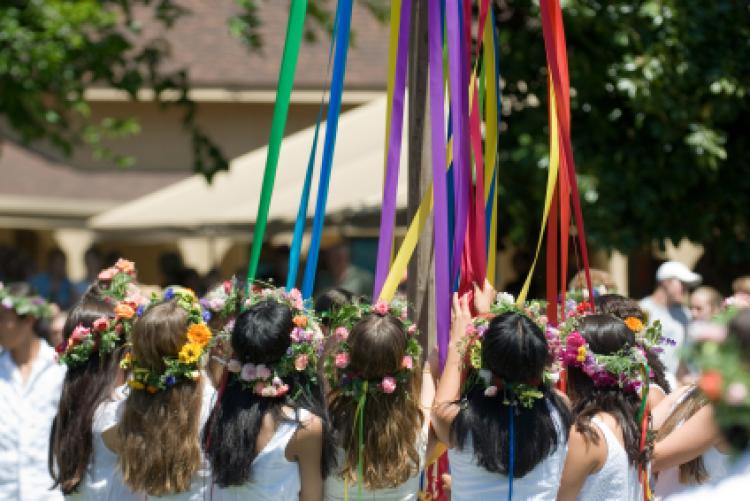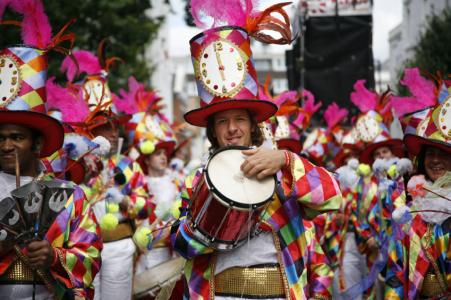
Do You Get a Black Moon?
What is a Black Moon, and why does it happen in December?
The first Monday of May is a bank holiday in the United Kingdom. It is a day off in England, Wales, Scotland, and Northern Ireland.
Yes. It is a day off for the general population, and schools and most businesses are closed.

Maypole dancing is a popular tradition on the Early May Bank Holiday.
©iStockphoto.com/Thomas Sarradet
May Day, officially known as Early May Day Bank Holiday, is a combination of two holidays in the UK:
May 1 or May Day is an ancient celebration of spring and the rebirth taking place in nature. Many ancient British customs associated with the day come from the old Roman festival of Floralia, where the people wore colorful clothes and were pelted with beans and flowers—symbols of fertility.
In the United Kingdom, May Day traditions—some of which are more than 2000 years old—are still alive in many towns and villages. The ancient Celts welcomed spring during Beltane by lighting bonfires or the ‘fire of Belt.’ Its fertility rituals have carried through to today, including crowning a May Queen and dancing around a pole or a tree.
The Full Moon in May is named after flowers
International Workers’ Day has deep roots in the 130 years of the labor movement and its efforts to improve workers’ conditions across the globe.
May 1st or the first Monday in May in the UK is a day for parades and demonstrations, particularly in London. Trade unions usually organize the marches, and people travel far to join the protests. Sometimes the demonstrations can escalate to violence, riots, and looting. In 2000, more than 90 people were arrested, and nine police officers were injured during anti-capitalist protests in London.
7 holidays with dark histories
In Britain, Celtic people celebrated the festival of Beltane on the first of May to mark the halfway point between spring and summer. The fire was believed to cleanse, purify, and increase fertility.
The Beltane Fire Festival takes place on Calton Hill in Edinburgh, Scotland, from April 30 to May 1. Up to 12,000 people meet for a ritualized and theatrical celebration to mark the arrival of summer: Beltane. The festival combines a mix of fire, drumming, and pagan performance.
Maypole dancing involves a tradition of decorating a tall pole with colorful ribbons. Children dance around the maypole to make patterns with the colored ribbons.
It is believed that the maypole has its roots in Roman Britain around 2000 years ago when soldiers celebrated spring by dancing around decorated trees while giving thanks to their goddess Flora.
Other May Day celebrations derived from Floralia include crowning a May Queen as a human replica for the Roman goddess Flora. Women make and wear floral garlands that the May Queen also wears while she oversees her “court.”
In Scotland and Ireland, girls used to go out very early to wash their faces in the morning dew. This was supposed to ensure a good corn crop, more cows, and increase fertility.
Jack-in-the-Green is another ancient custom where men dress up in green foliage to represent the Green Man: a symbol of fertility. The Green Man is also associated with the mischievous fairy Puck, a character from A Midsummer Night’s Dream by William Shakespeare.
Morris dancing is also associated with the beginning of May. Dancers dress in white with bells on various parts of their costumes and carry handkerchiefs and long wooden sticks. The dancing is accompanied by accordion music.
Queen’s Platinum Jubilee in 2022
Bank holidays can be different in England, Wales, Scotland, and Northern Ireland. English and Welsh bank holidays are the same, St. Andrew’s Day is Scottish, while St Patrick’s Day and Battle of the Boyne are bank holidays in Northern Ireland.
In 2020 and 1995, the Early May Bank Holiday was moved to May 8 to coincide with Victory in Europe Day, or VE Day, marking the 50th and 75th anniversaries of the end of World War II in Europe.
In Scotland, the Early May Bank holiday has been observed on the first Monday in May since 1871 but was only introduced in the rest of the United Kingdom in 1978 for trade unionists to celebrate. It was held on the first Monday in May to minimize the damage to businesses.
Public holidays in the UK were first defined in the Bank Holidays Act of 1871. Today, the laws are set as statutory holidays, common law holidays, or by royal proclamation.
| Year | Weekday | Date | Name | Holiday Type | Area |
|---|---|---|---|---|---|
| 2019 | Mon | May 6 | Early May Bank Holiday | Bank Holiday | |
| 2020 | Fri | May 8 | Early May Bank Holiday / VE Day | Bank Holiday | |
| 2021 | Mon | May 3 | Early May Bank Holiday | Bank Holiday | |
| 2022 | Mon | May 2 | Early May Bank Holiday | Bank Holiday | |
| 2023 | Mon | May 1 | Early May Bank Holiday | Bank Holiday | |
| 2024 | Mon | May 6 | Early May Bank Holiday | Bank Holiday | |
| 2025 | Mon | May 5 | Early May Bank Holiday | Bank Holiday | |
| 2026 | Mon | May 4 | Early May Bank Holiday | Bank Holiday | |
| 2027 | Mon | May 3 | Early May Bank Holiday | Bank Holiday | |
| 2028 | Mon | May 1 | Early May Bank Holiday | Bank Holiday | |
| 2029 | Mon | May 7 | Early May Bank Holiday | Bank Holiday |
While we diligently research and update our holiday dates, some of the information in the table above may be preliminary. If you find an error, please let us know.

What is a Black Moon, and why does it happen in December?

When will the next comet be visible?

Why do mornings keep getting darker after the December solstice?

The summer bank holiday is on the first Monday of August in Scotland and the last Monday of August in England, Wales and Northern Ireland.